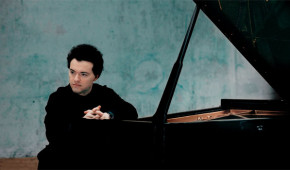
Concert Summary
In a co-production of the Kennedy Center and Pro Musica Hebraica, Evgeny Kissin, a pianist of depth, lyricism, and power, presented an entirely unique and deeply personal program in the Kennedy Center Concert Hall: the music and poetry of East European Jewry. For the first time ever, Mr. Kissin brought together his two great passions, classical music and Jewish literature. His program featured rare solo piano works by early twentieth-century Russian Jewish composers inspired by traditional Jewish music, including Alexander Veprik’s Sonata No. 2, along with Ernest Bloch’s magnificent 1935 Piano Sonata. In addition, he recited personally selected Yiddish poetry of uncommon depth and beauty.
“Without question he is a phenomenal pianist, a deeply intuitive and sensitive musician”
–The New York Times
Opening remarks by PMH Chairman, Charles Krauthammer:
Tonight, we present tonight four masterpieces from late-19th and early-20th century composers — from that great moment of Jewish cultural Renaissance that swept Eastern Europe and produced an extraordinary outpouring of Jewish creativity in both word and music.
This turn-of-the-century flourishing saw a proliferation of poetry, theater, literary publications of every kind in the two Jewish languages of Eastern Europe: Yiddish and a newly and miraculously revived Hebrew.
This same surge of Jewish national identity found expression in music — perhaps most dramatically in the composers you will hear tonight — Ernst Bloch, Alexander Krein, Moshe Milner and Alexander Veprik — who sought to create a new classical music of profound and distinctive Jewish sensibility.
Tonight we celebrate both aspects of this Renaissance — Yiddish poetry and Jewish music — brought together by the two great passions of tonight’s remarkable artist, the great Evgeny Kissin.
You already know, as does the world, of Evgeny’s incomparable gifts as a pianist. Tonight you will learn also about his love of Yiddish, the language of his Russian-Jewish ancestors, with his recitation of the poems of two of its greatest masters: Yitzhak Leibush Peretz and Hayim Nahman Bialik.
I dare say this will be the first time Yiddish has been declaimed from this stage. At least since Jackie Mason — and that wasn’t poetry.
Equally unique will be tonight’s music. The pieces Evgeny will play are some of the finest exemplars of that birth of modern Jewish music before the upheaval of revolution, the dislocation of war and the hammer of Stalin brought it to a premature halt.
Which is what makes tonight’s performance so historically unique. You know the Bloch. But the other compositions – the Krein, Milner, and Veprik — have never had a concert hall performance in the United states. Indeed, have rarely been played anywhere since the 1930s.
Krein’s “Suite dansee,” for example, we found buried deep in the archives of the Library of Congress. Like the other pieces on the program — and many others that never made the cut — we would send the manuscript to Evgeny. And await his verdict.
Anxiously. You see, Evgeny’s return e-mails – swift and spare — were delivered with telegraphic economy, especially the “nyets” for those that did not meet his standards. Those that did meet his standards – indeed, exceeded them – will be performed tonight and for many nights to come. You will see no page turner tonight. Evgeny has taken this music to heart and said publicly he will play it for the rest of his life.
One other thing you should know: Fiercely proud of his Jewishness and outspoken about the harassment and ostracism of Israelis and Israeli artists, Evgeny, on December 7, took Israeli citizenship as a public declaration of solidarity with the largest — and only sovereign — Jewish community on earth.
Tonight is Evgeny’s first concert hall appearance in America as a citizen of Israel. Yet another first.
Enough from me. Ladies and gentlemen, it is my great pleasure to welcome you to an evening of classical Jewish music and Yiddish poetry with the incomparable Evgeny Kissin.
Concert Program
MOSHE MILNER: Farn opsheyd (Kleyne rapsodie) (1939)
ERNEST BLOCH: Piano Sonata, Op. 40 (1935)
HAYIM NAHMAN BIALIK, Selected Yiddish poems
ALEXANDER KREIN: Suite dansee (1928), First Five Pieces
YITZHAK LEIBUSH PERETZ: Selected Yiddish poems
ALEXANDER VEPRIK: Sonata No. 2 (1924)
Translated Yiddish Poems
- Oyf dem hoykhn barg (High on a Mountain)
- Erev friling (Just Before Spring)
- Es hot mikh farplontet (I Was Entangled)
- Kh’volt geven a baln visn (It would be nice to know)
- Mayn muze (My Muse)
- A teatr iz di velt (The World’s a Theater)
- Meyn nisht (Don’t Think)
- Di Tsayt (Time)
- Hof un glayb (Hope and Faith)
- Dos yor (The Year)
- Amol (Once)
- Zay mir gut (Be Good to Me)
Concert Previews
- Anne Midgette (Washington Post): Kissin offers Jewish composers, Yiddish poets in striking concert departure
- Greer Fay Cashman (Jerusalem Post): Kissin receives Israeli citizenship, to recite Yiddish poetry
Concert Reviews
- Anne Midgette (Washington Post): Evgeny Kissin plays forgotten composers and declaims poetry in stunning performance
- Charles T. Downey (Ionarts): Evgeny Kissin and the Yiddish Word
- Jenna Weissman Joselit (From Under the Fig Tree): The sounds of music
- John Podhoretz (Commentary): Overwhelmed and Awed at the Kennedy Center
- Bev Fleisher (DC Metro Theater Arts): Each word seemed to come directly from his soul
- Ilona Oltuski (GetClassical): On a Mission to Celebrate Jewish Heritage
Follow-Up Performances
- Evgeny Kissin at Verbier Festival (2014)
- Evgeny Kissin: Jewish Music and Poetry at Carnegie Hall (2015)
More
- How Evgeny Kissin Became a One-Man Yiddish Pride Movement (Forward)
- Evgeny Kissin’s statement upon taking Israeli citizenship: I do not want to be spared the troubles which Israeli musicians encounter
- Charles Krauthammer on Kissin’s defiant stand against bigotry (Washington Post)
- Evgeny Kissin’s personal website